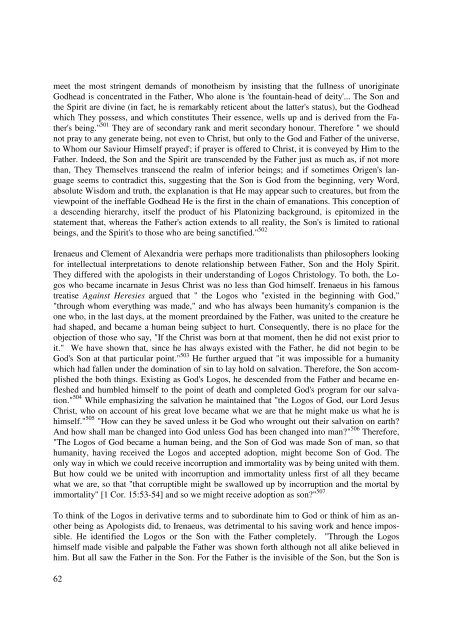Scripture and God in Christianity
Scripture and God in Christianity
Scripture and God in Christianity
You also want an ePaper? Increase the reach of your titles
YUMPU automatically turns print PDFs into web optimized ePapers that Google loves.
meet the most str<strong>in</strong>gent dem<strong>and</strong>s of monotheism by <strong>in</strong>sist<strong>in</strong>g that the fullness of unorig<strong>in</strong>ate<br />
<strong>God</strong>head is concentrated <strong>in</strong> the Father, Who alone is 'the founta<strong>in</strong>-head of deity'... The Son <strong>and</strong><br />
the Spirit are div<strong>in</strong>e (<strong>in</strong> fact, he is remarkably reticent about the latter's status), but the <strong>God</strong>head<br />
which They possess, <strong>and</strong> which constitutes Their essence, wells up <strong>and</strong> is derived from the Father's<br />
be<strong>in</strong>g." 501 They are of secondary rank <strong>and</strong> merit secondary honour. Therefore " we should<br />
not pray to any generate be<strong>in</strong>g, not even to Christ, but only to the <strong>God</strong> <strong>and</strong> Father of the universe,<br />
to Whom our Saviour Himself prayed'; if prayer is offered to Christ, it is conveyed by Him to the<br />
Father. Indeed, the Son <strong>and</strong> the Spirit are transcended by the Father just as much as, if not more<br />
than, They Themselves transcend the realm of <strong>in</strong>ferior be<strong>in</strong>gs; <strong>and</strong> if sometimes Origen's language<br />
seems to contradict this, suggest<strong>in</strong>g that the Son is <strong>God</strong> from the beg<strong>in</strong>n<strong>in</strong>g, very Word,<br />
absolute Wisdom <strong>and</strong> truth, the explanation is that He may appear such to creatures, but from the<br />
viewpo<strong>in</strong>t of the <strong>in</strong>effable <strong>God</strong>head He is the first <strong>in</strong> the cha<strong>in</strong> of emanations. This conception of<br />
a descend<strong>in</strong>g hierarchy, itself the product of his Platoniz<strong>in</strong>g background, is epitomized <strong>in</strong> the<br />
statement that, whereas the Father's action extends to all reality, the Son's is limited to rational<br />
be<strong>in</strong>gs, <strong>and</strong> the Spirit's to those who are be<strong>in</strong>g sanctified." 502<br />
Irenaeus <strong>and</strong> Clement of Alex<strong>and</strong>ria were perhaps more traditionalists than philosophers look<strong>in</strong>g<br />
for <strong>in</strong>tellectual <strong>in</strong>terpretations to denote relationship between Father, Son <strong>and</strong> the Holy Spirit.<br />
They differed with the apologists <strong>in</strong> their underst<strong>and</strong><strong>in</strong>g of Logos Christology. To both, the Logos<br />
who became <strong>in</strong>carnate <strong>in</strong> Jesus Christ was no less than <strong>God</strong> himself. Irenaeus <strong>in</strong> his famous<br />
treatise Aga<strong>in</strong>st Heresies argued that " the Logos who "existed <strong>in</strong> the beg<strong>in</strong>n<strong>in</strong>g with <strong>God</strong>,"<br />
"through whom everyth<strong>in</strong>g was made," <strong>and</strong> who has always been humanity's companion is the<br />
one who, <strong>in</strong> the last days, at the moment preorda<strong>in</strong>ed by the Father, was united to the creature he<br />
had shaped, <strong>and</strong> became a human be<strong>in</strong>g subject to hurt. Consequently, there is no place for the<br />
objection of those who say, "If the Christ was born at that moment, then he did not exist prior to<br />
it." We have shown that, s<strong>in</strong>ce he has always existed with the Father, he did not beg<strong>in</strong> to be<br />
<strong>God</strong>'s Son at that particular po<strong>in</strong>t." 503 He further argued that "it was impossible for a humanity<br />
which had fallen under the dom<strong>in</strong>ation of s<strong>in</strong> to lay hold on salvation. Therefore, the Son accomplished<br />
the both th<strong>in</strong>gs. Exist<strong>in</strong>g as <strong>God</strong>'s Logos, he descended from the Father <strong>and</strong> became enfleshed<br />
<strong>and</strong> humbled himself to the po<strong>in</strong>t of death <strong>and</strong> completed <strong>God</strong>'s program for our salvation."<br />
504 While emphasiz<strong>in</strong>g the salvation he ma<strong>in</strong>ta<strong>in</strong>ed that "the Logos of <strong>God</strong>, our Lord Jesus<br />
Christ, who on account of his great love became what we are that he might make us what he is<br />
himself." 505 "How can they be saved unless it be <strong>God</strong> who wrought out their salvation on earth?<br />
And how shall man be changed <strong>in</strong>to <strong>God</strong> unless <strong>God</strong> has been changed <strong>in</strong>to man?" 506 Therefore,<br />
"The Logos of <strong>God</strong> became a human be<strong>in</strong>g, <strong>and</strong> the Son of <strong>God</strong> was made Son of man, so that<br />
humanity, hav<strong>in</strong>g received the Logos <strong>and</strong> accepted adoption, might become Son of <strong>God</strong>. The<br />
only way <strong>in</strong> which we could receive <strong>in</strong>corruption <strong>and</strong> immortality was by be<strong>in</strong>g united with them.<br />
But how could we be united with <strong>in</strong>corruption <strong>and</strong> immortality unless first of all they became<br />
what we are, so that "that corruptible might be swallowed up by <strong>in</strong>corruption <strong>and</strong> the mortal by<br />
immortality" [1 Cor. 15:53-54] <strong>and</strong> so we might receive adoption as son?" 507<br />
To th<strong>in</strong>k of the Logos <strong>in</strong> derivative terms <strong>and</strong> to subord<strong>in</strong>ate him to <strong>God</strong> or th<strong>in</strong>k of him as another<br />
be<strong>in</strong>g as Apologists did, to Irenaeus, was detrimental to his sav<strong>in</strong>g work <strong>and</strong> hence impossible.<br />
He identified the Logos or the Son with the Father completely. "Through the Logos<br />
himself made visible <strong>and</strong> palpable the Father was shown forth although not all alike believed <strong>in</strong><br />
him. But all saw the Father <strong>in</strong> the Son. For the Father is the <strong>in</strong>visible of the Son, but the Son is<br />
62
















